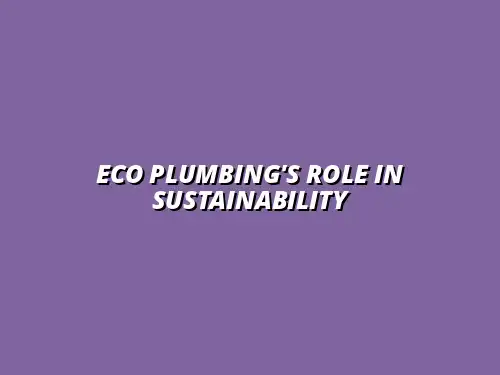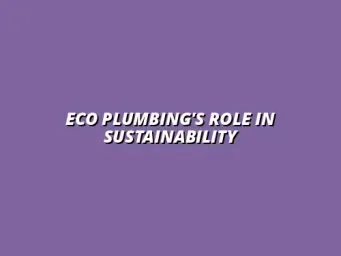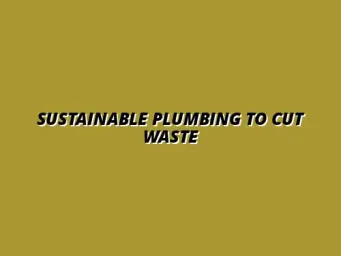The Role of Eco Plumbing in Urban Environmental Strategies
Eco plumbing is becoming a vital part of urban environmental strategies as cities work to combat climate change and resource depletion. By integrating sustainable practices into plumbing systems, cities can reduce their ecological footprint and promote a healthier environment. This article explores what eco plumbing is, the challenges urban areas face, and the many benefits of adopting these systems.
Understanding Eco Plumbing and Its Core Principles
Definition of Eco Plumbing: An Overview
Eco plumbing refers to plumbing systems designed to minimize environmental impact while enhancing efficiency. These systems often incorporate technologies that reduce water consumption and energy usage. By focusing on sustainability, eco plumbing aims to create a balance between modern convenience and environmental responsibility.
In essence, eco plumbing is about using resources wisely and ensuring that plumbing systems support the health of urban ecosystems. This means implementing practices that protect local water sources and reduce pollution. It's a proactive approach to plumbing that benefits both the environment and communities. Learn more about the benefits of eco-friendly plumbing for homeowners.
Key Features of Eco Plumbing Systems
Eco plumbing systems are characterized by several important features that make them stand out from traditional plumbing. Here are some key aspects:
- Water-efficient fixtures: Low-flow toilets, showerheads, and faucets reduce water usage without sacrificing performance.
- Rainwater harvesting: Capturing and using rainwater for non-potable purposes can significantly lower water consumption.
- Greywater recycling: Reusing water from sinks or showers reduces the demand for fresh water.
- Solar water heating: Utilizing solar energy to heat water can dramatically cut energy bills and carbon emissions.
By incorporating these features, eco plumbing systems can save resources and promote a more sustainable urban environment. As cities adopt these practices, they contribute to a greener planet. Discover how to achieve significant water savings with green plumbing.
The Urgency for Cities to Adopt Sustainable Plumbing Solutions
Current Environmental Challenges Facing Urban Areas
Urban areas today are facing numerous environmental challenges, including water scarcity, pollution, and climate change. With growing populations, the demand for water is rising, putting pressure on existing resources. Additionally, traditional plumbing systems can lead to significant water waste and increased energy consumption.
The urgency for cities to adopt eco plumbing solutions is more apparent than ever. As climate change continues to disrupt weather patterns, cities must find ways to adapt and become more resilient. Implementing sustainable plumbing practices is a critical step in this direction. For example, regular water heater maintenance is crucial for efficiency.
Impact of Traditional Plumbing on Urban Ecosystems
Traditional plumbing systems can have several negative effects on urban ecosystems. The over-extraction of water can deplete local aquifers, while untreated wastewater can pollute rivers and lakes. Here are some impacts:
- Overconsumption: Excessive water use leads to shortages, especially in drought-prone areas.
- Pollution: Runoff from sewage systems can contaminate natural water bodies, harming aquatic life.
- Energy waste: Inefficient plumbing systems require more energy to operate, contributing to greenhouse gas emissions.
Given these challenges, it's clear that traditional plumbing practices need to evolve. By shifting towards eco plumbing, urban areas can better protect their ecosystems and promote sustainable living. Simple fixes like addressing a leaky kitchen faucet can make a difference.
Benefits of Eco Plumbing for Urban Environments
Reducing Water Waste Through Innovative Technologies
One of the primary benefits of eco plumbing is its ability to reduce water waste. Innovative technologies, such as smart sensors and efficient fixtures, play a crucial role in this effort. These advancements ensure that water is used efficiently and only when necessary.
Eco plumbing systems can help cities reduce their overall water consumption significantly. This not only conserves a vital resource but also helps lower utility bills for residents. When cities implement these technologies, they set the stage for a more sustainable future. Learn how to conserve water in your bathroom with simple plumbing adjustments.
Minimizing Energy Consumption in Urban Plumbing Systems
Eco plumbing also focuses on energy efficiency, which is vital for urban environments. By using energy-saving technologies, cities can significantly cut down on their overall energy usage. Here are some benefits of minimizing energy consumption:
- Lower utility costs: Energy-efficient systems can lead to reduced heating and cooling costs.
- Reduced carbon footprint: By using less energy, cities can lower their greenhouse gas emissions.
- Enhanced resilience: Sustainable plumbing systems make urban areas more resilient to energy shortages.
With the right investments in eco plumbing, cities can not only save energy but also promote a healthier and more sustainable urban environment. Achieving sustainable goals through eco-plumbing is achievable.
Integrating Eco Plumbing into Urban Infrastructure Planning
Collaborative Approaches: Government, Engineers, and Communities
Integrating eco plumbing into urban infrastructure requires collaboration among various stakeholders. Local governments, engineers, and community members all play essential roles in this process. By working together, they can create effective plans that prioritize sustainability.
Community involvement is particularly important. Engaging residents in the planning process helps ensure that eco plumbing solutions are tailored to meet the unique needs of each area. This collaborative approach fosters a sense of ownership and commitment to sustainable practices.
Case Studies of Cities Successfully Implementing Eco Plumbing
Many cities around the world have successfully implemented eco plumbing systems, showing that sustainability is achievable. For example:
- San Francisco: The city has introduced stringent water efficiency standards and promotes rainwater harvesting.
- New York City: NYC has invested in green infrastructure, including green roofs and permeable pavements.
- Melbourne: The city has implemented a comprehensive stormwater management system that includes recycling and reuse.
These case studies serve as inspiring examples for other urban areas to follow. They demonstrate that eco plumbing is not only beneficial but also practical for modern urban life. For local plumbing services in Birmingham, check out this plumber in Billesley.
Common Questions About Eco Plumbing and Urban Sustainability
How does eco plumbing contribute to long-term cost savings?
Eco plumbing contributes to long-term cost savings by reducing both water and energy bills. The initial investment in eco plumbing systems can be offset by the savings realized over time. These systems are designed to be efficient, so they require less maintenance and have lower operational costs.
Moreover, cities that invest in eco plumbing can avoid costly infrastructure repairs down the line. By focusing on sustainable practices, they can create more resilient systems that require fewer resources to maintain. It's a win-win for both the environment and the economy!
What specific technologies are integral to eco plumbing systems?
Several technologies are crucial for effective eco plumbing systems. These technologies help enhance efficiency and promote sustainability. Some of the most significant include:
- Low-flow fixtures: Designed to reduce water consumption without sacrificing performance.
- Smart irrigation systems: Use weather data to optimize watering schedules and reduce waste.
- High-efficiency water heaters: Reduce energy consumption and improve energy efficiency.
By incorporating these technologies, cities can ensure that their plumbing systems are eco-friendly and efficient, paving the way for a more sustainable future.
Strategies for Implementing Eco Plumbing in Urban Areas
As cities strive to become more sustainable, transitioning to eco plumbing is essential. Effective implementation of eco plumbing requires a strategic approach. It involves several key steps that ensure urban areas can upgrade their plumbing systems responsibly and efficiently. By focusing on sustainable practices, cities can significantly reduce their environmental impact.
Transitioning to eco plumbing not only conserves resources but also promotes community engagement. This can lead to innovative solutions tailored to the unique needs of urban areas. Here are some critical strategies that cities can adopt to implement eco plumbing successfully.
Steps for Cities to Transition Towards Eco Plumbing
To shift toward eco plumbing, cities must take a systematic approach. Evaluating existing infrastructure is the first step in determining what upgrades are necessary. This evaluation will reveal areas where sustainability can be improved.
Additionally, cities should prioritize the following steps:
- Conduct comprehensive audits of current plumbing systems.
- Identify inefficiencies and potential areas for eco-friendly upgrades.
- Plan the integration of eco plumbing technologies.
- Set realistic timelines for implementation and monitoring.
Evaluating Current Plumbing Infrastructure for Sustainable Upgrades
Evaluating the current plumbing infrastructure is vital to identify where eco plumbing can be integrated. Cities should assess not only the physical components but also the management practices in place. This evaluation will help in pinpointing where upgrades can yield the most significant environmental benefits.
Considerations for evaluation include:
- Age and condition of existing plumbing systems.
- Water usage patterns and flow rates.
- Current energy consumption for heating water.
By understanding these factors, cities can make informed decisions about which eco plumbing solutions to implement.
Funding and Incentives for Eco Plumbing Initiatives
Financing eco plumbing initiatives can be a challenge, but various funding sources can support these upgrades. Local governments should explore grants, subsidies, and low-interest loans aimed at sustainable programs. Additionally, engaging with private investors can open up new financing opportunities.
Cities can benefit from:
- Federal and state grants for environmental projects.
- Tax incentives for sustainable building practices.
- Public-private partnerships to share the financial burden.
Engaging the Community in Eco Plumbing Practices
Engaging the community is a critical aspect of implementing eco plumbing. Public education plays a significant role in raising awareness about sustainable plumbing practices. When residents understand the benefits, they are more likely to participate in eco-friendly initiatives.
To engage the community effectively, cities can consider these strategies:
- Organizing workshops and information sessions.
- Creating educational materials that explain eco plumbing benefits.
- Utilizing social media to spread awareness and success stories.
Raising Awareness: The Importance of Public Education
Public education is essential for promoting eco plumbing. By informing residents about the environmental benefits and potential savings, cities can foster a culture of sustainability. Educational programs can cover various topics, from water conservation techniques to the importance of eco plumbing systems.
Effective communication can include:
- School programs to educate children about water conservation.
- Community events focused on sustainable living.
- Online resources with tips on eco plumbing practices.
Encouraging Residential Participation in Eco Plumbing Solutions
To enhance participation in eco plumbing, cities must incentivize residents. Providing clear benefits encourages homeowners to adopt sustainable plumbing practices. Local governments can create programs that facilitate residential participation in eco plumbing solutions.
Incentive ideas include:
- Subsidies for installing water-efficient fixtures.
- Rebates for rainwater harvesting systems.
- Community challenges to motivate households to reduce water usage.
Future Trends in Eco Plumbing for Urban Development
As we look ahead, it's clear that eco plumbing will continue evolving to meet urban needs. Emerging technologies are paving the way for more efficient and sustainable plumbing systems. Staying updated on these trends can help cities plan for the future.
Some of the most exciting trends to watch include:
- Smart plumbing systems that monitor water usage and leaks.
- Advanced filtration and treatment technologies.
- Integration of IoT devices to optimize water use.
Emerging Technologies Shaping the Future of Urban Plumbing
Emerging technologies are vital for transforming urban plumbing. Smart systems can analyze usage patterns and alert users about inefficiencies, helping to conserve resources. These technologies not only improve plumbing performance but also foster a culture of sustainability.
Examples of promising technologies include:
- Smart meters that provide real-time usage data.
- Water-saving appliances designed for efficiency.
- Automated leak detection systems.
Predicted Policy Changes Supporting Eco Plumbing Initiatives
Policy changes are expected to play a crucial role in advancing eco plumbing initiatives. Governments are likely to introduce stricter regulations for water usage and encourage the adoption of sustainable practices. These policies can create a framework that supports cities in their transition to eco plumbing.
Policies to anticipate include:
- Incentives for homeowners who retrofit for water efficiency.
- Mandatory standards for new plumbing installations.
- Funding for research in sustainable plumbing technologies.
Reflecting on the Importance of Eco Plumbing for Urban Sustainability
In summary, eco plumbing plays a vital role in promoting sustainability in urban areas. It helps reduce water waste, save energy, and improve the overall health of our environment. By implementing eco plumbing strategies, cities can make significant strides towards achieving long-term sustainability.
As cities face growing environmental challenges, it is crucial to embrace eco plumbing practices. Local governments should take the initiative to prioritize sustainable plumbing solutions as part of their urban development plans.
Summarizing the Environmental Impact of Eco Plumbing
The environmental impact of eco plumbing is profound. It not only conserves resources but also enhances the quality of urban life. Communities that adopt eco plumbing contribute to a healthier ecosystem and a more sustainable future.
Ultimately, cities that invest in eco plumbing will reap the benefits for generations to come. The positive changes extend beyond immediate resource savings to long-term environmental health.
Call to Action: Encouraging Local Governments to Embrace Eco Plumbing
It's time for local governments to embrace eco plumbing as a key component of urban sustainability strategies! By taking proactive steps, they can lead the way in creating cleaner, more efficient cities. Let's encourage our leaders to prioritize eco plumbing solutions for a better tomorrow!










